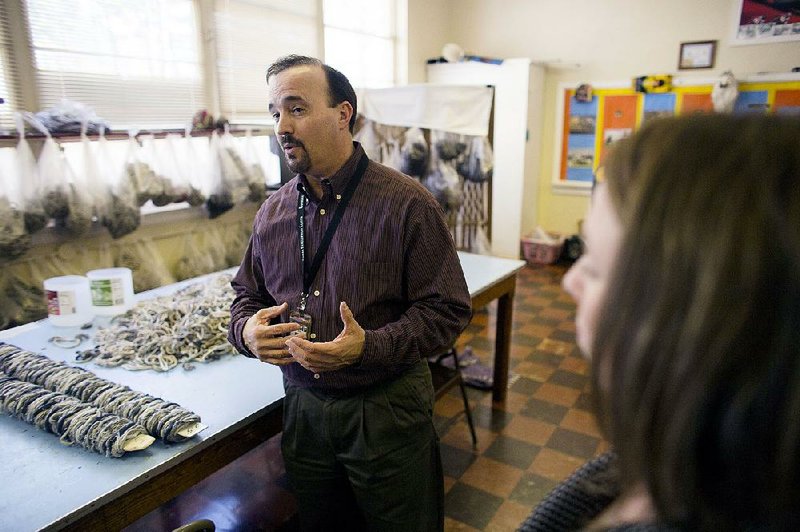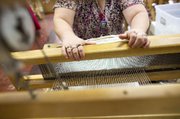BOONEVILLE -- Booneville Human Development Center Director Jeff Gonyea smiled and nodded as he passed a man with large headphones covering his ears who was singing out loud as he walked the path from one building to the next.
Gonyea, a youthful man with short black hair and a close-cut goatee, pointed to the curving and sometimes uneven concrete sidewalk, then waved his arm to take in the expansive 5,000-acre compound with its hills, simple landscaping, and dozens of buildings, staff cottages and dormitories.
"It's even more beautiful in the fall," he said. "You can see, though, why we can only take ambulatory clients."
The Booneville facility is one of five human development centers operated by the state Department of Human Services to care for the developmentally disabled. The other centers are in Arkadelphia, Jonesboro, Conway and Warren.
Built in 1910 as a relocation center for tuberculosis patients, the Human Services Department took over the Booneville facility in 1973. Many of the aging buildings -- some of which have been placed on the National Register of Historic Places -- as well as the grounds are in need of repair or removal.
A recent survey released by the Office of Long Term Care, done in response to a 20-page report in January from the advocacy group Disability Rights Arkansas, noted problems with the Booneville facility's physical condition.
The survey, which was completed after a Feb. 12 inspection, chided the facility's operators for failing to ensure that sidewalks were in good repair to prevent potential injuries; peeling paint and missing roof shingles on buildings; unlocked exterior doors; protruding nails and exposed wiring.
The facility is required to submit a plan of correction to the Office of Long Term Care by this week.
Human Services Department spokesman Amy Webb said the problems cited after the Long Term Care inspection were minor and will be resolved.
"The sidewalks where the ground has shifted will be replaced when the weather warms up. Any unlocked doors in the unused buildings that were mentioned were secured while surveyors were on campus," Webb said.
She added that Gonyea has also established a new protocol that requires staff members to regularly check the doors of unused buildings to ensure that they remain secure.
The initial report from Disability Rights Arkansas called for the center's closure, saying the facility was in dangerous disrepair with crumbling asbestos walls and roofs; unmoored, aged electrical wiring; and a deserted swimming pool full of stagnant water.
Disability Rights Arkansas -- an independent nonprofit organization designated since 1977 by Arkansas governors to implement the federally funded and authorized protection of disabled people -- also said the facility has an inordinate number of patient-restraint instances when compared with other facilities.
The Developmental Disabilities Service Board approved a written response in February that called the report full of "bias and inaccuracies" designed to "intentionally mislead the public."
"The Board wants to emphasize that they have confidence in the staff at the Booneville HDC and know that the residents are safe and well cared for," the statement read.
Restraints
With the sun beaming down, a man of about 50 twisted his chair to form a semicircle with two other residents who sat on the lawn by the front door of one of the buildings. Simultaneously, they turned their heads toward Gonyea as he exited his vehicle and walked toward them.
"Hello, Jeff Gonyea," a red-haired woman of about 30 called out, eliciting a short laugh and a wide smile from Gonyea.
"Hey there," he responded, lifting his hand in greeting.
Another resident grinned widely toward him, tipped his hat and said, "Hi, Jeff Gonyea."
Inside, activity suddenly stopped as Gonyea walked through a classroom door. The students -- ranging in age from their 20s into their 60s -- each responded in different ways to Gonyea's presence. Some stared at their desks, continuing their work without any interruption. Some seemed irritated at the intrusion.
Others called out in gleeful squeals and rushed toward the director, calling out "Jeff Gonyea" as a greeting.
The Booneville facility's population is 92 percent dually diagnosed, meaning clients are developmentally disabled and suffer from mental health issues, Gonyea said. The state's four other human development centers average about 86 percent dually diagnosed clients, Webb said.
"Booneville specializes in serving only intellectually or developmental disabled, ambulatory individuals with severe behavioral challenges, including behavior that has resulted in interaction with the criminal justice system or previous hospitalizations," Webb said Friday.
The Disability Rights Arkansas report cited the Booneville location for what it said was excessive use of chemical or manual restraints. The report covered a period from June through September of 2014.
According to Human Service Department reports showing restraint usage for all of 2014, the Booneville facility -- which has 127 filled beds -- used restraints 968 times. Statistics for the other facilities showed:
• The Arkadelphia facility, with 118 filled beds, used restraints 61 times.
• The Conway facility, with 483 filled beds, used restraints 1,199 times.
• The Jonesboro facility, with 109 filled beds, used restraints 155 times.
• The Warren facility, with 88 filled beds, used restraints 214 times.
Reports of self-injurious and aggressive behavior that can lead to the use of restraints was largely consistent throughout all five facilities.
Booneville had 862 behavioral incidents; Arkadelphia had 857; Jonesboro had 727; and Warren had 707. The exception was the Conway facility -- the largest in the state -- which had 2,981 self-injurious and aggressive behavior reports.
"Hopefully these numbers are accurate and aren't due to underreporting at other facilities," said Justin Nickels, spokesman for Disability Rights Arkansas. "Overall, the restraint use has always concerned us. Why isn't this screaming to people that something is going on? Hopefully, with some oversight, they can fix it."
Nickels added that the Human Services Department should require the staff to be retrained and stricter policies enacted.
Webb said training is already provided to direct-care staff members and that there is no evidence that restraints have been improperly used.
"We train staff using nationally recognized intervention techniques that are safe and noninvasive when possible to minimize disruptive and potentially harmful behavior. This ensures the safety of the disruptive individual and others. The techniques emphasize de-escalation with the use of a restraint being the last resort, all under the oversight of licensed clinicians."
The Booneville center's restraint use was not an issue cited in the Office of Long Term Care survey. However, Webb said, it was her understanding that the inspectors pulled case files involving restraints, including individuals who have more frequent restraints than other clients, and no deficient practices were found.
"Use of restraint is always a last resort and something we'd like to never do," Webb said. "When we do have to restrain an individual, this shows it has been done in compliance with regulations."
Richard Bokker, whose niece has been a Booneville resident since 1978, said the center has never used restraints -- medical or manual -- on his niece, who is bipolar and has Down syndrome.
"They have always treated her really nice. They're like family there," said Bokker, who is her legal guardian. "I love that facility. It's been great, and the staff is awesome. She's just home."
Master Plan
Turning the steering wheel of his Jeep to the left, Gonyea pulled up next to a large metal building with lumber and chain-link fencing piled beside it.
"The new rec center," Gonyea said, smiling. "This will be the first new building constructed here since 1964."
Gonyea slowly drove around the 1,000 acres that contain the dozens of buildings and cottages. He pointed to a small, white church that was built in 1927 and had been updated with a sculpture garden. Other buildings had new roofs, and some had been freshly painted.
When he reached the edge of the woods, Gonyea got out of the vehicle to unlock a gate blocking the road. A few minutes later, he smiled expectantly right before rounding a curve that revealed a large lake with a brand-new fishing dock.
"We bring the clients out here to fish and have picnics," Gonyea said. "They love it."
Gonyea didn't hesitate to admit that the aging center needs a lot of improvement. A master plan from 2011 estimated that it would take at least $20 million to remove, repair and replace all of the buildings at the Booneville center.
The money for the improvements has yet to be funded by the Legislature.
Webb said the Arkansas Building Authority is working on an assessment of the physical plants of all the state's human development centers. Those findings are expected later this year.
Pouring more money into an aging facility is fiscally irresponsible, the Disability Rights Arkansas report said.
"The Booneville HDC accounts for 10 percent of the state's HDC population. Yet the facility has received 30 percent of the total HDC funding for improvement projects and maintenance over the last few years," the report said.
Gonyea, who has been the director of the Booneville center for more than five years, is adamant that closing or relocating the center would be a mistake. A large portion of the facility's 311 staff members have been there for numerous years -- some since the center opened.
"It's home," he said. "Our staff turnover is the lowest of all the human development centers. They enjoy what they do. If you're here for a paycheck, you won't last very long. This is family."
Bokker said that when he takes his niece home for the holidays, she is always eager to get back to the facility.
"You can ask her, and that's all she knows. It's her home," Bokker said. "She's always ready to go back to the hill because that's where all her friends are. I wouldn't like it whatsoever if they closed it. I would be totally upset. That's her home. Right there. That's her home."
SundayMonday on 03/15/2015

